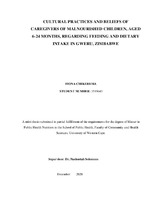| dc.contributor.advisor | Solomons, Nasheetah | |
| dc.contributor.author | Chikerema, Fiona | |
| dc.date.accessioned | 2021-03-31T14:59:02Z | |
| dc.date.available | 2021-03-31T14:59:02Z | |
| dc.date.issued | 2020 | |
| dc.identifier.uri | http://hdl.handle.net/11394/8101 | |
| dc.description | Master of Public Health - MPH | en_US |
| dc.description.abstract | The burden of malnutrition continues to persist and is the major cause of morbidity and mortality in children. According to the results of the Zimbabwe Multiple indicator cluster survey in 2019, stunting remains high at (26.8%) and the leading form of malnutrition, affecting 1 in 3 children less than 5 years in Zimbabwe. Suboptimal feeding practices have been identified as one of the many causes of malnutrition. Various studies have shown that many risk factors of malnutrition can be addressed during the crucial first 1000 days of life. Cultural beliefs, values, and practices play a vital role in the pre and postnatal period. However, there is a knowledge gap in how culture influences the caregivers regarding feeding and dietary intake. Therefore, the study’s major aim was to explore the cultural beliefs and practices of caregivers of malnourished children between 6-24 months, regarding dietary intake and feeding practices in Gweru, Zimbabwe. | en_US |
| dc.language.iso | en | en_US |
| dc.publisher | University of the Western Cape | en_US |
| dc.subject | Caregiver | en_US |
| dc.subject | Complementary feeding | en_US |
| dc.subject | Culture beliefs | en_US |
| dc.subject | Dietary practices | en_US |
| dc.subject | Determinants | en_US |
| dc.title | Cultural practices and beliefs of caregivers of malnourished children, aged 6-24 months, regarding feeding and dietary intake in Gweru, Zimbabwe | en_US |
| dc.rights.holder | University of the Western Cape | en_US |

